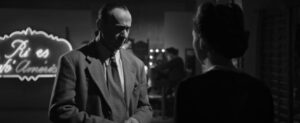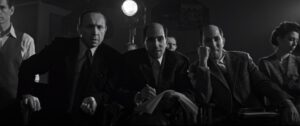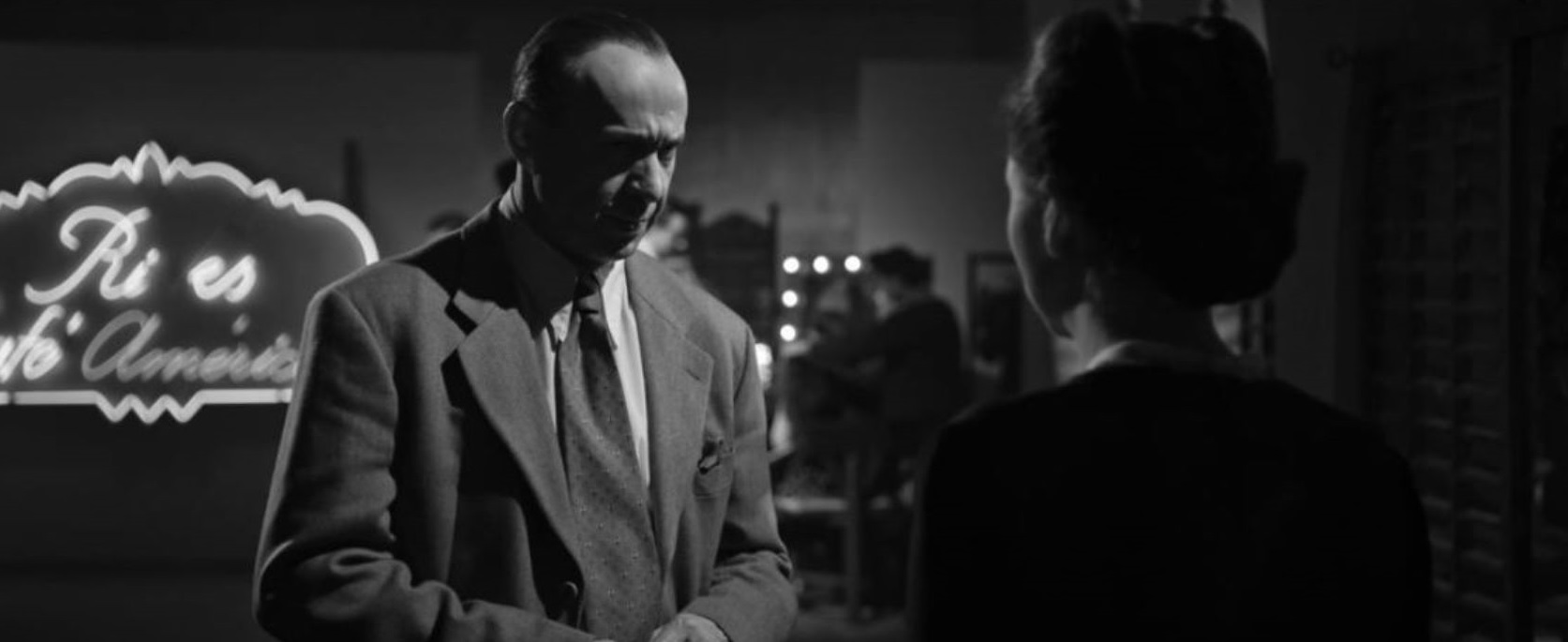Movie Info
Movie Info
- Director
- Yvan Topolanszky
- Run Time
- 1 hour
VP Content Ratings
- Violence
- 1/10
- Language
- 2/10
- Sex & Nudity
- 3/10
- Star Rating
Relevant Quotes
“Those who withhold kindness from a friend forsake the fear of the Almighty.
He has told you, O mortal, what is good; and what does the Lord require of you but to do justice, and to love kindness, and to walk humbly with your God?
Rated TV-MA. Running time: 1 hour, 38 min.

This Hungarian produced film biography will be of great interest to the many devotees of director Michael Curtiz’s Casablanca. However, it is not a good source to learn about “the man behind Casablanca” due to the script’s falsifying of history–more on this later. Nonetheless first-time director Tamas Yvan Topolanszky’ film, streaming on Netflix, is an interesting one thanks to a combination of excellent acting and crisp black & white photography.
The highly fictionalized story begins in the spacious office of studio head Jack L. Warner (Andrew Hefler) where he is meeting with producer Hal B. Wallis (Scott Alexander Young) and a man named Johnson (Declan Hannigan) from the Office of War Information. President Roosevelt and Congress have just declared war, and the government wants to turn their new film project into a propaganda piece that “will win the war.” Wallis resists the pressure, pointing out that the project has been underway for over three weeks. The title is still to be chosen—no one likes the title of the unstaged play the film is based on, Everybody Comes to Rick’s.
Curtiz, ably played by Ferenc Lengye, who even looks a lot like the director, is anything but the paragon of kindness enjoined by the Scriptures. First, he is a sexual predator, as we see early on when he takes advantage of a waitress who apparently has acting ambitions. On the set he shouts at and insults his cast, especially actor Conrad Veidt (Christopher Krieg), who plays a Nazi official. The kindly actor has not been able to inject enough strength and nastiness into his performance, so the director insults and berates him in order to stir up the man’s anger.
Equally distasteful is the way that Curtiz behaves toward the young woman who calls him on the telephone. We learn that she is not an ambitious aspiring actress, though she does sneak onto the movie set after Curtiz hangs up on her. She is Kitty (Evelin Dobos), his daughter brought over with her mother from Hungary to New York and abandoned there. As with Curtiz, they are Jewish and have left the country because of its growing antisemitism. Curtiz still has a sister and other family members unable to to get out.
The film is only half-written, its ending still up in the air. Will Rick go away with Ilsa or will she stay with her Czech Resistance leader husband Victor Laszlo, who is fleeing Nazi arrest? Should the love triangle be solved by the killing of Laszlo? Thus, we see a lot of the twin brothers working on the script, Julius and Philip Epstein (Yan Feldman and Rafael Feldman). And Johnson is constantly sticking his nose in, demanding that Curtiz, by acceding to his demands to make the film a jingoistic tale of patriotism, prove whose side he is on in the war. His native Hungary had sided with the Nazis.
There are a lot of authentic details in the film, some humorous, such as the famous gaffe caused by the foreign director’s accent that made some of his instructions hard to understand. Although the director had been brought to Hollywood by Warner in the mid-Twenties, he had not mastered the English language. This led to the crew having difficulties understanding his instructions. His set director brings a gaggle of poodle dogs onto the set, infuriating the director. Curtiz had said the day before that he had wanted “puddles” for the set so that the actors’ footsteps on the rain-soaked pavement would be picked up by the camera.

Casablanca fans hoping for recreations of iconic scenes from the classic might be disappointed that the actors playing Bogart and Bergman are shot in the background or with their faces blurred or obscured by shadows. We do see a lot of S.Z. Sakall (József Gyabronka), who plays Rick’s friend Carl in the movie. And also Conrad Veidt, the Nazi villain. The Nazi’s fate, we learn, was determined late in the filming process, as the Epstein brothers kept adding and/or revising the script. Dooley Wilson (Oscar Reyes) as Sam is also seen a lot sitting at his piano. Another humorous touch is the employment of a troupe of “little people” at the airport portraying the ground crew tending to the flimsy, less than full sized airplane in the final scene. The limited budget had not allowed for the use of a full-sized plane, so a wood and cardboard shell was built, the midgets, seen only in the long shot, giving the illusion of full size.
The film’s deviation from history is unfortunate—there was no government official demanding the film be turned into a propaganda tool—Johnson is a character better suited to the 1950s when the government was blacklisting filmmakers deemed “Red.” And the plot line centering on Kitty is only slightly true, the two indeed becoming estranged, but she had never been abandoned by her father in New York. When Curtiz brought her and her mother over—in 1930, not 1941—it was to Hollywood where he arranged for her tutoring and dancing lessons. His then new wife Bess Meredyth had a good relationship with the girl, whereas in the movie she is not even aware of the girl’s existence, mistaking her at first for another of her husband’s infidelities.
This radical departure from history is due to the filmmakers’ desire to draw a parallel between the choice that Rick makes about Ilsa and her husband in the movie and Curtiz’s decision about Kitty, go with her or stay and finish his movie, at the end of the film. I know that the Hollywood dictum is that when filmmakers have to choose between making a good film and being true to history, they will always choose the story, but I believe that if this results in spreading falsehood, then it is too high a price to pay for what is supposed to be art.

I would like to rate this film “5” but must give it a “3.5” instead, despite the excellence of photography and acting. What leads me to add the “.5” is that the film does not sugarcoat Curtiz’s character. He may have been a great director, but as a human being, he is in the same class as Harvey Weinstein. He certainly does not measure up to what the Bible calls “kindness.” Had there been a #MeToo Movement in 1941, Michael Curtiz probably would have been barred from the gates of Warner Brothers. Who knows whether we would have been blessed with such a timeless classic as Casablanca, or not?
This review will be in the June issue of VP along with a set of questions for reflection and/or discussion. If you have found reviews on this site helpful, please consider purchasing a subscription or individual issue in The Store.

